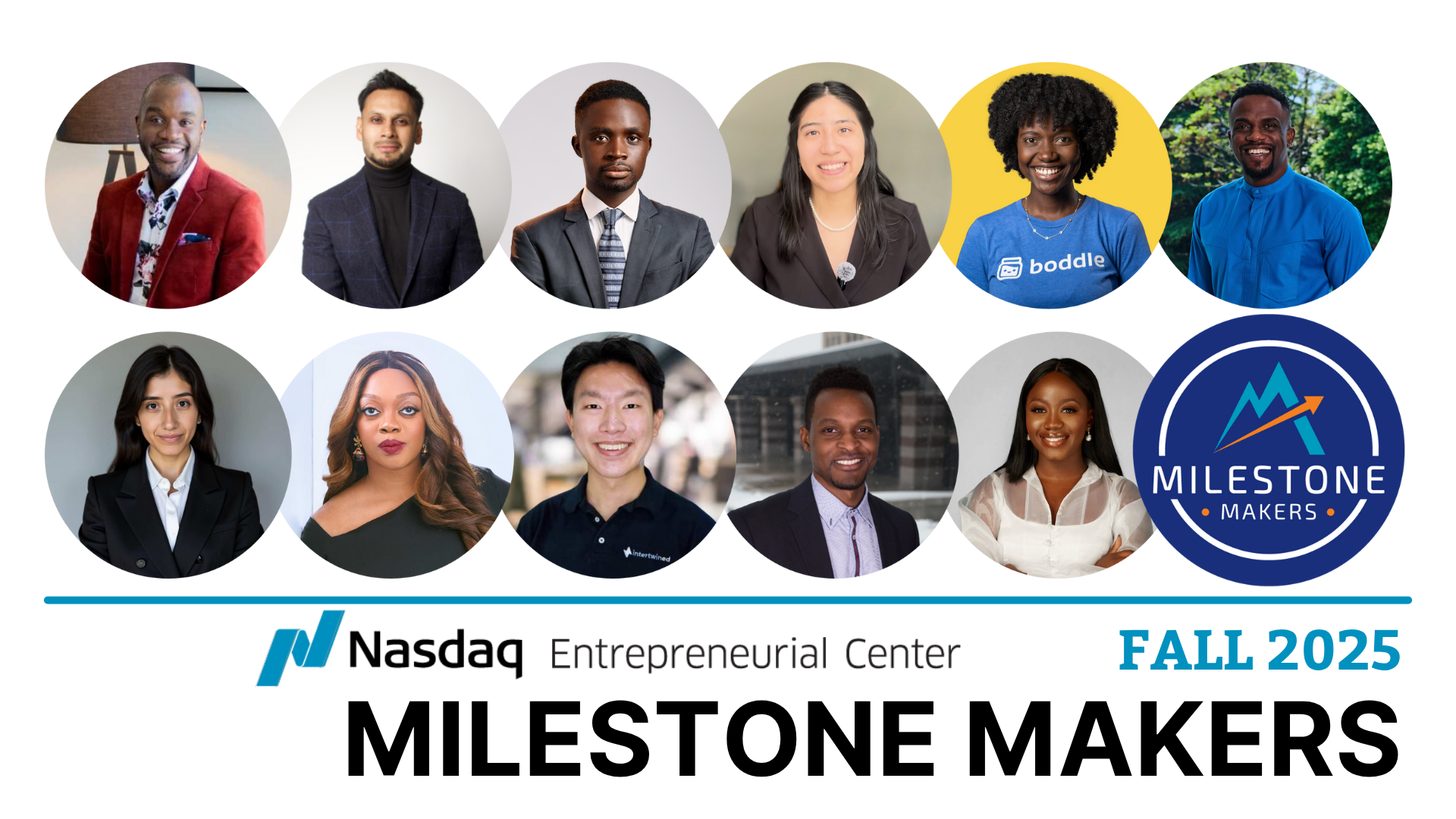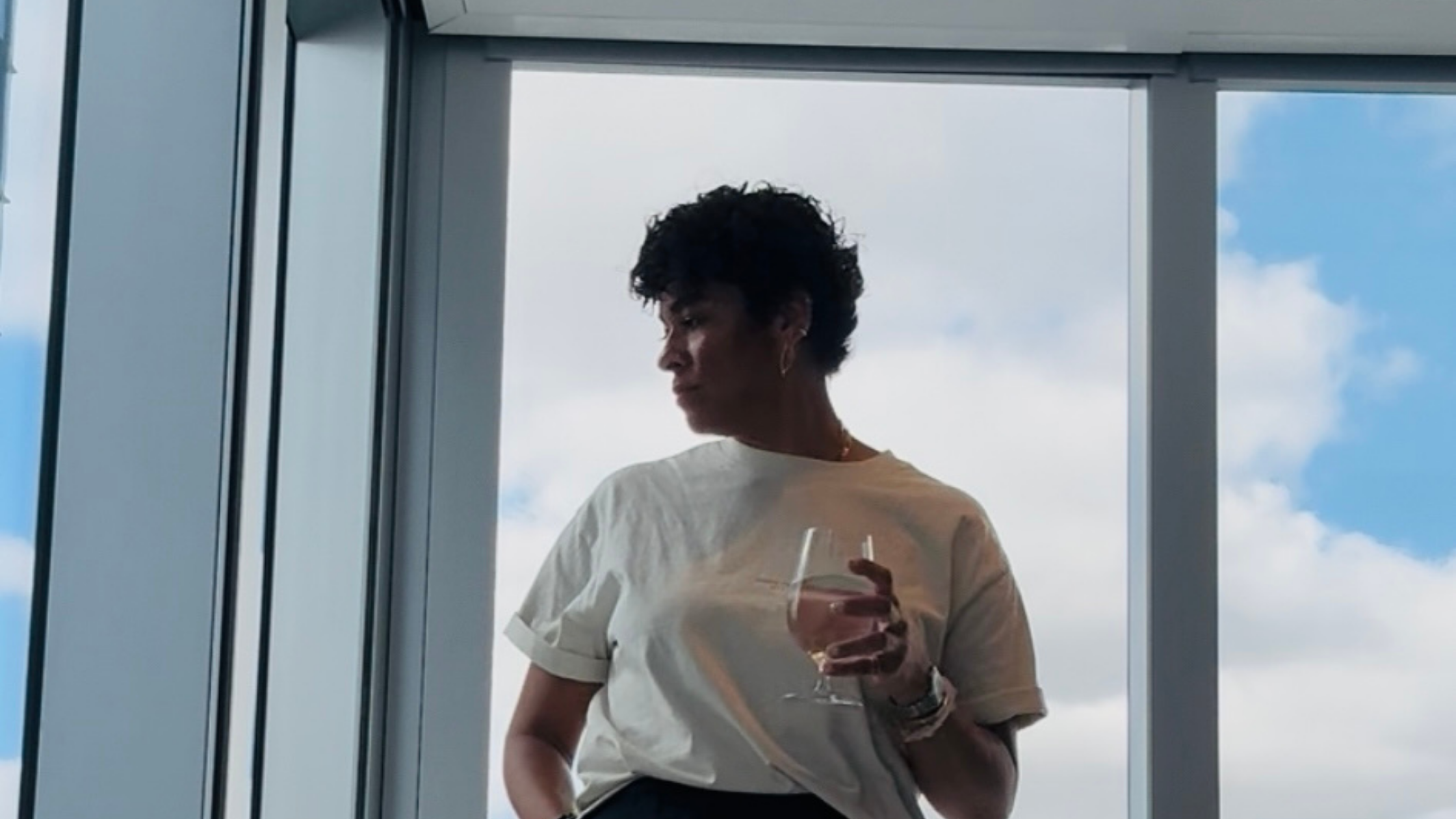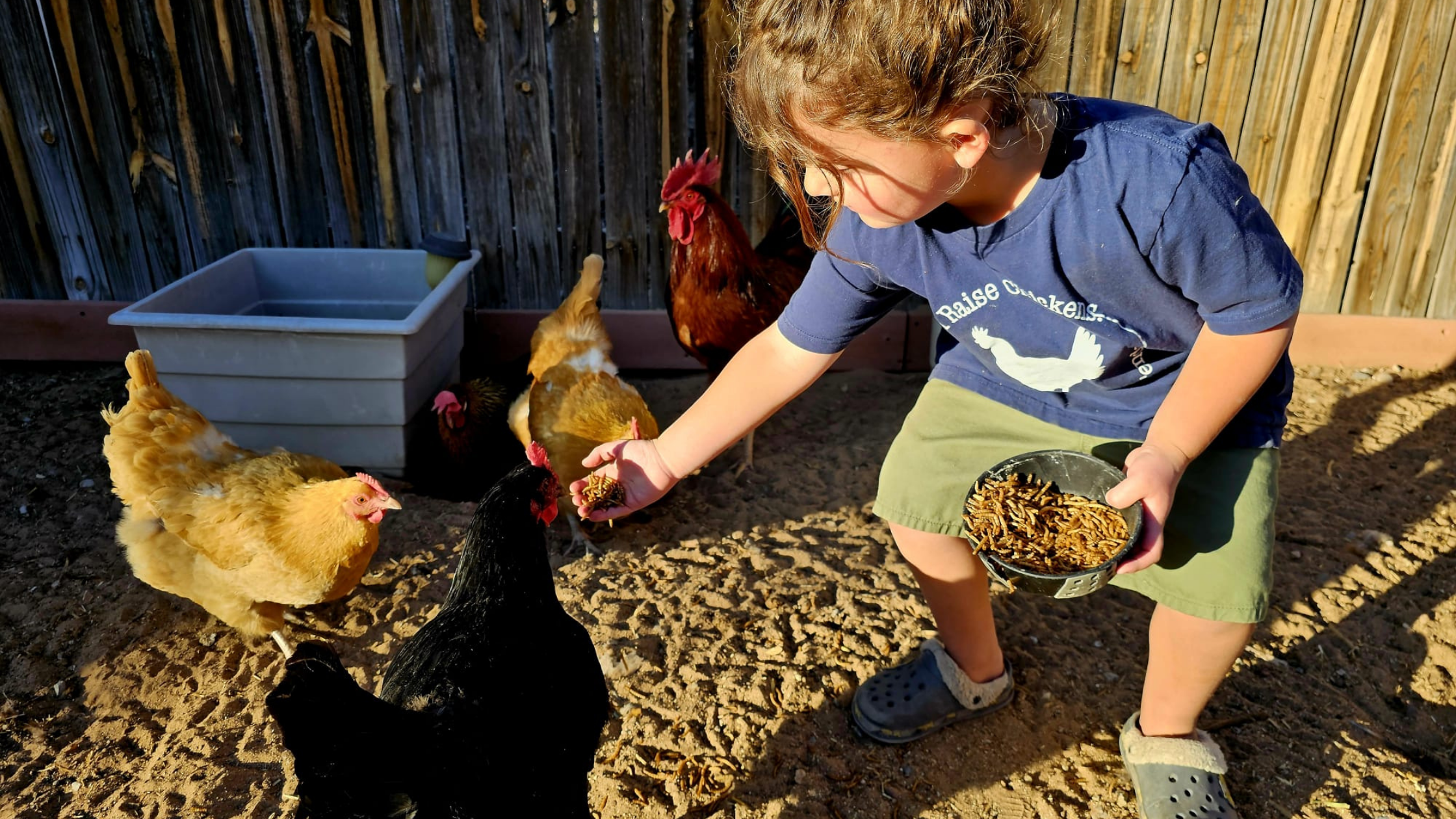Fatima Dicko is the founder and CEO of Jetpack, a peer-to-peer platform that allows college students to get the last-minute products they need in less than 15 minutes. By using GPS and a user-friendly platform, Jetpack uses technology to make it easier for people to share with others in their immediate vicinity. The Nasdaq Entrepreneurial Center took a moment to catch up with Fatima on her journey thus far.
So what does “entrepreneurship” mean to you?
FD: When I think about entrepreneurship, I think about the intersection between what’s needed and what’s possible. Entrepreneurship means being determined to bring a new solution to an important problem despite the understanding of both the emotional and financial risks involved in doing so. It means choosing passion over probability in order to bring an idea to life. Oftentimes, entrepreneurship means bringing old ideas together in new ways.
How did Jetpack as a company come to be?
FD: Jetpack has evolved drastically over the last couple of years. The idea first started as a way to help students on college campuses get items they need really quickly. As a student who forgot last-minute items all the time, I realized that other students were experiencing the exact same thing. The idea was very simple: Give students backpacks and fill the backpacks with sample size products, such as tampons, phone chargers, chewable coffee, etc., that students need quickly all the time. When people needed products, the app would find the nearest person with the requested item in their backpack. This also served as a cool marketing platform for sample-size products.
Starting at Stanford, We found students willing to be Jetpackers and filled their backpacks with popular items in specific locations (e.g., energy drinks at the law school). Students who wanted to make money would then carry those “Jetpacks” around campus. Jetpackers would be notified if a request was within a 15-minute walking radius.
After a while, people starting asking for the weirdest stuff that we didn’t have. From chewable coffee to bottles of wine, demand was far from predictable. Pre-stocking in jetpacks would not be scalable in an economical way. Since we didn’t always know what consumers wanted, it was difficult to stock the right items. That’s when we started thinking about the potential to use our location-based platform to connect urgent needs to anyone on the platform willing to fulfill those needs.
What’s the biggest lesson learned on your journey so far?
FD: The biggest lesson so far has been the importance of measuring progress — specifically how each member of the team understands where and when we’re making progress. The key to executing is keeping goals simple, clear and measurable. Outside of being able to effectively unite the team around a common vision, keeping goals measurable allows individual team members to remain motivated and make direct correlations between their work and the overarching company goals.
In addition to the importance of measuring, what you measure is just as vital. Identifying the single metric that is the strongest indicator of company performance is so crucial at an early stage. Many people refer to this as a company’s “magic metric.” For us, it was important that we measured the percentage of orders fulfilled by other students on the platform in under 15 minutes. At any given point, if this metric was not hitting our target threshold, it was important for us to revisit certain assumptions.
How is your company changing the landscape?
FD: Jetpack is changing the P2P sharing economy by turning anyone who downloads the app into a walking vending machine. People are becoming more and more familiar and comfortable with the sharing economy. The idea of having access to something rather than owning something has become the preferred method of commerce for many people. We’re most excited about the potential to bring the proven sharing economy model to consumer goods — the uber for essentials. We’ve seen sharing work well with cars and houses and we believe it can work well with everyday items, such as phone chargers, shampoo, etc.
Each day, about one in six students broadcast a request for an item via text or email; but email alone doesn’t reach out to people in their area. By using GPS and a user-friendly platform, we make it easier to share with people in your area. The more we capture data on the most-requested products in the marketplace, the more we know what to pre-stock in Jetpacker’s backpacks.
What do you wish you knew when you started? Is there anything you would do differently?
FD: I wish I had a firm understanding of growth as an iterative process rather than an “inflection point”. The idea of growth often gets confused with elements of virality. Many people think that there’s a “lightbulb moment” where the company starts to achieve exponential growth. While that’s been the case for a few companies, what’s more common is a company achieving growth through a series of many small iterations that ultimately optimize the product. Understanding this early on would’ve helped me develop much more patience and focus on the consumer to help define the many small iterations we could make. Taking this approach has not only helped the company but has also helped my psychological well-being.
In terms of doing things differently, we probably should’ve started with the marketplace before the backpacks. In the beginning, the idea of using backpacks was very powerful and helped people understand how the platform worked; however, understanding what to put into the backpacks was difficult without data on product demand. In 2018, we made a very intentional decision to make some core changes to our product. Since our biggest challenge was an inability to predict demand and properly stock backpacks with the right products, we took an alternative approach to solve our problem. We’ve now moved to a model where any user can fulfill orders on the platform using their own things. This new version has led us to build what is now becoming an “immediate delivery marketplace” for college campuses. In hindsight, starting with the marketplace would’ve been a strong precursor to the backpacks.
Since we’ve made these change, we’ve seen some of the most exciting requests and transactions on the platform. We’ve seen people request and receive half-used shaving cream, a few sprays of dry shampoo, batteries, Hulu account passwords, Tide PODS and hundreds of other items.
One of the biggest benefits of moving to an “immediate need marketplace” is the ability to launch on campuses even faster. Before, we needed to onboard several official “Jetpackers” before the product could work on campus. Now, we can launch on campus via email listservs alone.
What credo do you live by as you grow the business?
FD: Companies don’t always fail because they run out of money, sometimes it’s because they run out of faith. Someone once told me that the only way you fail is if you run out of money or give up. As long as you have your idea, you are still in the running. It might take more time or pivots, but you can make it work. You’re done with your idea when you stop having ideas about your idea. I really believe that where there’s a will, there’s a way. It takes a lot of resilience to be a founder, but it’s great to think about potential success as a function of resilience rather than competence, luck and connections alone. In fact, there’s a recent article that talks about this here.
What advice do you have for fellow entrepreneurs about building and leading teams?
FD: When it comes to hiring people, the three most important things to look for are passion, work ethic and coachability. This comes from the idea that many things can be taught with the exception of the passion and work ethic. During the early stages, you honestly can’t put a price tag on the faith that your early team members have in your vision, product and future. Once you have a team of smart, hard-working people who have bought into the “why” of the company, it will be easier to potentially adjust how your team gets there without changing the morale of the team. In addition to pushing the company forward, being around smart, motivated people will continuously energize you, challenge you and push you to grow as a leader.
It’s also never too early to think about culture. Culture ends up being very critical to the success of your company. However, there’s a ton of misconceptions about culture and why it’s important. One of the most common traps is to have a loosely-defined culture that can’t be measured, which ultimately results in implicit bias during the recruiting process. Here are a few questions that are important to consider when thinking about culture:
- How and why is a certain culture necessary in order to achieve company goals and embody the mission of the organization?
- How will one screen for this culture in ways that are measurable and unbiased?
- Can others on the team verbally explain and describe the culture is in a concrete way?
Where do you find inspiration when faced with challenges?
FD: I love hearing stories from and about creators. Specifically, I love hearing stories about resilience and reflection during challenging phases of innovation and challenging the status quo. The biggest ideas were non-consensus ideas that received a great deal of pushback during the early days. It’s the courage of these disruptive creators that allowed great ideas to impact people throughout the world. I gain a lot of energy and inspiration when I learn about how others found the courage to create and keep going when things were difficult.
What does “success” look like for you? What do you think will help you achieve it?
FD: Many people view success as one static achievement during a specific moment in time. Over the years, I’ve tried to focus more on the journey rather than the destination. There’s so much to gain from the journey that we often neglect. If I can grow as a leader, help others grow and have fun during the process of pursuing something great, that in and of itself is a form of success.
Also, one of my favorite quotes is “Success is liking yourself, liking what you do, and liking how you do it.” by Maya Angelou. For me, at the end of any journey, I want to look back on how I treated people along the way. Success looks like reaching my personal goals while having a positive impact on many people along the way. I also believe that an important part of success that isn’t discussed enough is reaching your goals while never losing touch with the people who matter most.
What is your proudest and darkest moment so far? Share a key high and a key low from your journey if you can.
FD: I was really proud of our latest pivot to the marketplace. I believe the pivot has been the biggest piece of evidence showcasing our company’s ability to be flexible and solve a problem. It’s also been one of the most exciting moments for our team to analyze consumer data and use that data to make informed decisions about the business. Initially, I was concerned about the impact the pivot would have on the team; however, everyone was on board because the data was clear and the new solution still tied into the bigger mission. I was really proud of the enthusiasm and speed in which the entire team shifted to meet the needs of the consumer.
The darkest moment was probably launching our minimum viable product (MVP). We spent so much time getting the product ready and received a ton of data confirming that this was a problem that needed to be solved. Once we launched the first version of the product, we had very few users. Even users who expressed great enthusiasm about the idea were not using the product as frequently as we expected. The product was breaking every day and we had a difficult time keeping up with all of the incoming feedback. We questioned so many of our hypotheses and wondered where we were going wrong. When we dug more into the enthusiastic users who were not placing orders, we realized the order process wasn’t as intuitive as we thought. We then worked on one issue at a time based on priority. It took several iterations to get to a product that consumers loved but the first launch was definitely a challenging time. So much time and energy had been invested and I didn’t want to let myself or my team down.
What lesson did 2018 have for you? What do you look forward to in 2019?
FD: 2018 taught me the value of introspection in leadership. I believe the best leaders are committed to achieving greater levels of self-awareness. I took a class called Interpersonal Dynamics (aka Touchy Feely) at Stanford and it was super enlightening. I learned so much about myself, how others are impacted by my actions, and the ways in which I react to other people in the world. I learned that this level of understanding is what truly allows different personalities to build familiarity, comfort and trust to achieve common goals.
In 2019, I want to 10x both the frequency and depth of my introspection. I want to understand how I make other people feel in various scenarios and settings. I was to gain deep insights into the elements of my personality that drain and the elements that uplift. I want to increase the number of interactions that maximize having a positive impact on other people. Feedback is the breakfast of champions and the best way to self-reflect is to first receive as much feedback as possible.
Many entrepreneurs continue to perfect their daily routines to support their work and greater vision; would you mind sharing your morning routine or a regular ritual that grounds your work each day?
FD: First, coffee. Then every morning starts with meditation, a green smoothie and a game of PUBG. I then use Feedly and Blinkist to get a snapshot of the day’s top news as well as explore a book on my list. I love playing basketball on weekend mornings. Outdoor basketball is my favorite because I meet interesting people from all walks of life who have the most fascinating stories. It’s a great, stress-relieving break from work.
Also, whenever I neglect to nurture the creative side of my brain, I feel an impact on my energy an overall mood. I love dance, writing, and most recently, learning how to use turntables. Not only can creative hobbies bring better balance to people’s lives, but they can also bring creativity to work that sparks innovation and enhances problem-solving. I’m a believer in the fact that true innovation comes from the right side of our brains while the left side is just the way to implement these ideas.
What kind of an entrepreneur do you want to be known as, as in, what do you want your legacy to be?
FD: What matters most to me is finding value in the overlooked qualities of people. I want to be someone who contributed to others feeling important, inspired and ultimately empowered to pursue their own dreams. I realize that my life experiences have helped me become more comfortable with risk and develop the privilege of being able to see myself as someone who has the potential to bring an idea to life. This is a large psychological barrier that many people are unfortunately not able to cross. In order to help others do so, it’s important that they build confidence by excelling in work that utilizes their unique, super talents. I want to be someone who helps people both identify these unique talents as well as find jobs that leverage these specific talents.
While many leaders have pushed their company missions to their teams, I believe the flaw in those actions is neglecting the missions of each individual on the team. I have seen what happens when people are given the confidence to innovate. My goal is to develop multiple people who are capable of seeing the potential within themselves.




